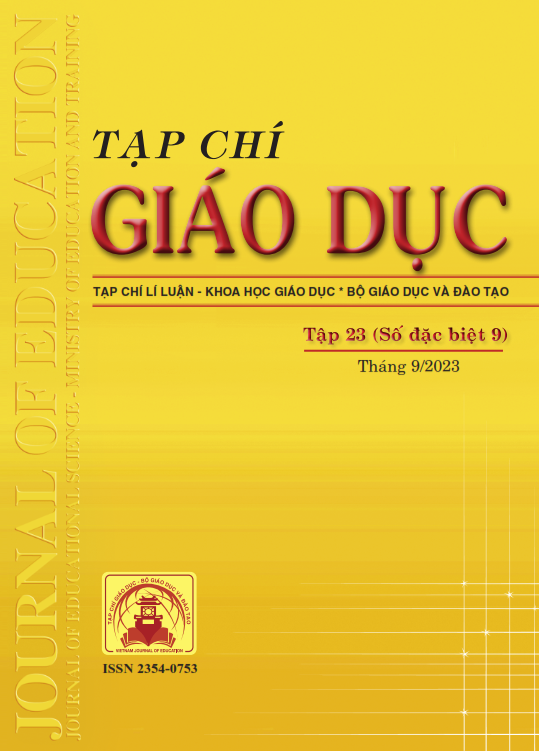Quản lí dạy học theo định hướng giáo dục thông minh
Tóm tắt
Smart education-oriented teaching has become and is becoming an essential trend in the digital age. However, in order to achieve the true effectiveness of this model, the implementation process needs to ensure the key factors such as smart learning environment, smart technology platform, smart learners, and smart educators... Through the method of studying documents and articles, this research systemizes some key features of smart education-oriented teaching and the main contents of this management work. The research results contribute to helping managers have a clearer direction when implementing smart education-oriented teaching, as well as serving as reference materials for related studies.
Tài liệu tham khảo
Alpaslan, D. K. (2021). Smart education framework. Smart Learning Environments, 8(1), 1-36. https://doi.org/10.1186/s40561-021-00170-x
Bernd Meier, Nguyễn Văn Cường (2016). Lí luận dạy học hiện đại: Cơ sở đổi mới mục tiêu, nội dung và phương pháp dạy học. NXB Đại học Sư phạm.
Cổ Tồn Minh Đăng (2023). Đặc điểm và một số mô hình dạy học theo định hướng giáo dục thông minh. Tạp chí Khoa học Giáo dục Việt Nam, 19(5), 7-11.
Devashree, R. (2023). Smart Education in India. India: Devashree Roychowdhury P. P. Savani University. https://www.researchgate.net/profile/DevashreeRoychowdhury/publication/371503480_Economic_Policy_Reforms_in_Post_Independence_India/links/6487687d2cad460a1b1168a7/Economic-Policy-Reforms-in-Post-Independence-India.pdf
Grajek. S. (2019). How Student Expectations Are Driving Digital Transformation. EDUCAUSE Center for Analysis and Research (ECAR), Higher Education Information Security Council (HEISC). Yale University.
Jayasena, N. S., Chan, D. W., Kumaraswamy, M. M., & Saka, A. B. (2023). Applicability of public-private partnerships in smart infrastructure development: The case of Hong Kong. International Journal of Construction Management, 23(11), 1932-1944.
Lê Đức Quảng (2023). Giáo dục thông minh và chiến lược xây dựng mô hình đại học thông minh ở vương quốc Thái Lan. Tạp chí Khoa học, Trường Đại học Tân Trào, 9(2), 123-132.
Noh, K.-S., S.-H. Ju, & J.-T. Jung. (2011). An exploratory study on concept and realization conditions of smart learning. Journal of Digital Convergence, 9(2), 79-88.
Trần Khánh Đức (chủ biên, 2022). Khoa học tư duy và phát triển năng lực tư duy khoa học trong giáo dục và đào tạo. NXB Đại học Quốc gia Hà Nội.
Trần Thị Hương (2009). Giáo trình Giáo dục học đại cương. NXB Đại học Sư phạm Thành phố Hồ Chí Minh.
UNESCO (2022a). Global innovations in smart education: an analytical review. Moscow: UNESCO IITE.
UNESCO (2022b). Smart Education Strategies for Teaching and Learning: Critical Analytical Framework and Case Studies. Moscow: UNESCO IITE.
Zhu, Z. T., Yu, M. H., & Riezebos, P. (2016). A research framework of smart education. Smart Learning Environments, 3, 1-17. https://doi.org/10.1186/s40561-016-0026-2
Đã Xuất bản
Cách trích dẫn
Số
Chuyên mục
Giấy phép

Tác phẩm này được cấp phép theo Ghi nhận tác giả của Creative Commons Giấy phép quốc tế 4.0 .












